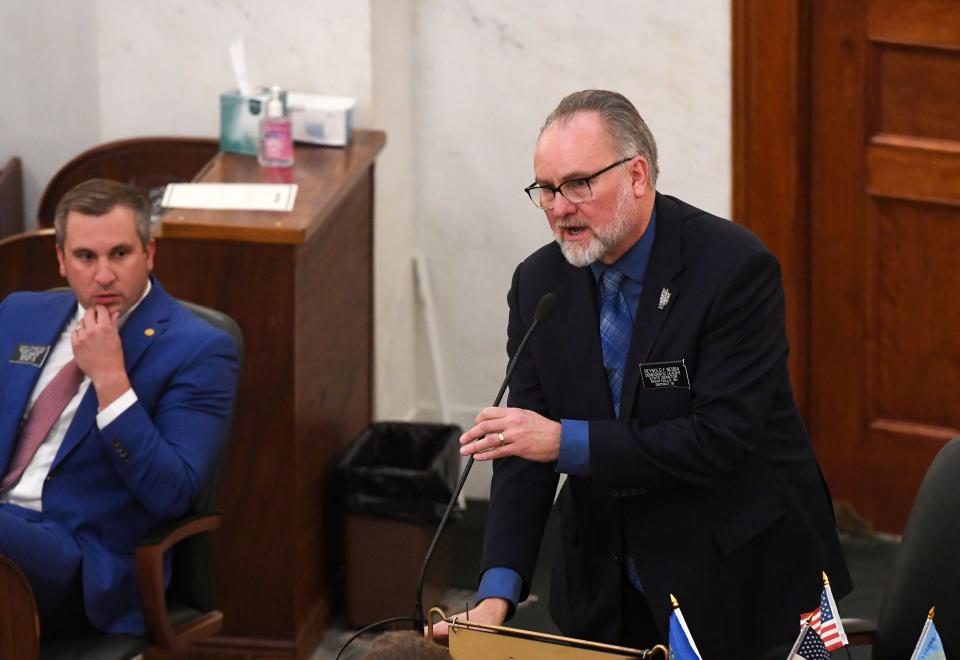Death penalty repeal bill fails by one vote in South Dakota Senate committee
- Oops!Something went wrong.Please try again later.
PIERRE — A bill that would have removed the death penalty as the state’s ultimate punishment failed to get out of a Senate committee Thursday morning by one vote.
SB 109, sponsored by Sen. Reynold Nesiba, D-Sioux Falls, had a litany of supporters who spoke about the morality of the death penalty and how many countries have removed capital punishment. But, testimony by the widow of a correctional officer who was murdered on the job had audience members in the Senate Judiciary room reaching for tissues and wiping eyes.

Lynette Johnson, who’s husband Ron Johnson was murdered in 2011 by two men incarcerated at the state prison, both of whom were later executed by the state, held up photos of her grandchildren who are growing up without their “papa.”
“Who’s going to protect the law enforcement?” she said, explaining that her youngest grandson remained angry that his grandfather was taken away from him. “We have to protect the law enforcement.”
More: 'I'm trying to put him back together': Wife of fallen correctional officer awaits killer's execution
Johnson’s testimony came after Attorney General Marty Jackley said by removing the death penalty as a form of punishment, there would be very little to deter people from committing heinous acts.
“Out of respect [to the victim’s families] don’t take away that option,” Jackley said.
Twenty people have been executed by South Dakota under the death penalty since 1877. The most recent execution was in 2019 when Charles Russell Rhines died by lethal injection for the 1992 murder of Donnivan Schaeffer.
Currently, Briley Wayne Piper is the state’s only inmate on death row for his involvement in the 2000 murder of Chester Allen Poage in Deadwood. Piper’s co-conspirator, Elijah Page, was executed in 2007. A third man involved in the murder was sentenced to life in prison.
More: South Dakota has used capital punishment since 1877. It’s showing no signs of stopping now.
Former Vermillion Sen. Arthur Rusch, a retired judge, was in support of repealing the death penalty. While he was in the Legislature, he consistently brought legislation to repeal the act.
He told lawmakers Thursday that death penalty cases put hardship on court staff, jurors and judges as they weighed sentencing someone to die. Rusch presided over one death penalty case in 1997 and sentenced the man to die.
“The courts have made it clear that the execution of a human being is one of the most significant decisions a government can make,” he said.
Denny Davis, the director for South Dakotans for Alternatives to the Death Penalty, looked to South Dakota’s pro-life stance and asked how citizens could pride themselves on that fact if the state continued to execute people. He also raised the concern about the amount of taxpayer funds spent to keep someone on death row.
During lawmaker remarks about sending the bill to the 41st day, some referred to scripture while others quoted Mahatma Gandhi.
Sen. Jim Stalzer, R-Sioux Falls, said he had worked with Johnson and apologized to Lynette for having to continue coming to Pierre to tell her husband's story. He voted to support the motion.
Sen. Jim Mehlhaff, R-Pierre, who voted to resist the motion, said that he didn’t believe the death penalty was justice. He spoke to the change certain inmates can have while in prison.
“The person who gets the needle in the arm is not the same person who committed the crime,” he said.
This article originally appeared on Sioux Falls Argus Leader: South Dakota will continue to use capital punishment after bill fails

